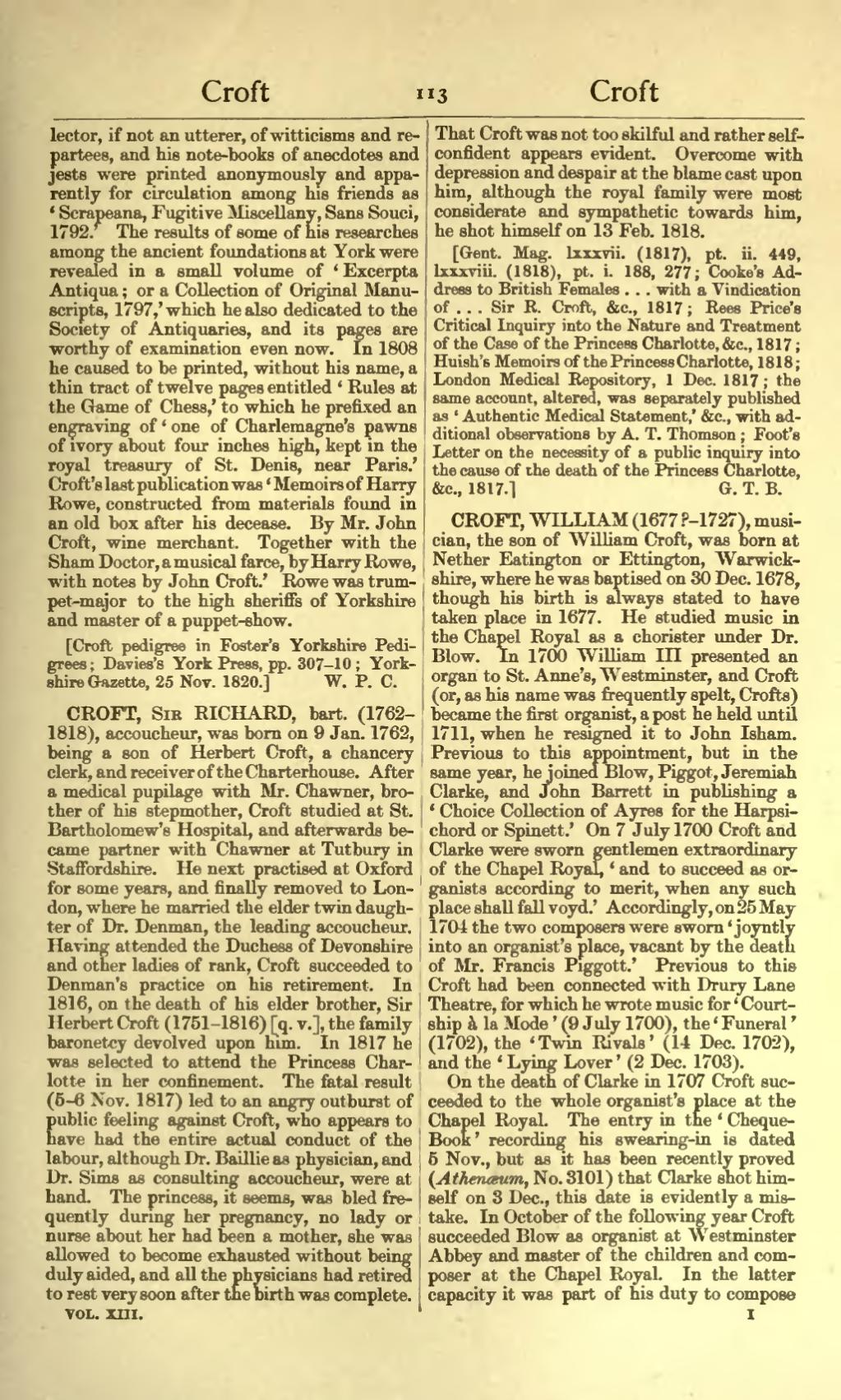lector, if not an utterer, of witticisms and repartees, and his note-books of anecdotes and jests were printed anonymously and apparently for circulation among his friends as 'Scrapeana, Fugitive Miscellany, Sans Souci, 1792.' The results of some of his researches among the ancient foundations at York were revealed in a small volume of 'Excerpta Antiqua; or a Collection of Original Manuscripts, 1797,' which he also dedicated to the Society of Antiquaries, and its pages are worthy of examination even now. In 1808 he caused to be printed, without his name, a thin tract of twelve pages entitled 'Rules at the Game of Chess,' to which he prefixed an engraving of 'one of Charlemagne's pawns of ivory about four inches high, kept in the royal treasury of St. Denis, near Paris.' Croft's last publication was 'Memoirs of Harry Rowe, constructed from materials found in an old box after his decease. By Mr. John Croft, wine merchant. Together with the Sham Doctor, a musical farce, by Harry Rowe, with notes by John Croft.' Rowe was trumpet-major to the high sheriffs of Yorkshire and master of a puppet-show.
[Croft pedigree in Foster's Yorkshire Pedigrees: Davies's York Press, pp. 307-10; Yorkshire Gazette, 25 Nov. 1820.]
CROFT, Sir RICHARD, bart. (1762–1818), accoucheur, was born on 9 Jan. 1762, being a son of Herbert Croft, a chancery clerk, and receiver of the Charterhouse. After a medical pupilage with Mr. Chawner, brother of his stepmother, Croft studied at St. Bartholomew's Hospital, and afterwards became partner with Chawner at Tutbury in Staffordshire. He next practised at Oxford for some years, and finally removed to London, where he married the elder twin daughter of Dr. Denman, the leading accoucheur. Having attended the Duchess of Devonshire and other ladies of rank, Croft succeeded to Denman's practice on his retirement. In 1816, on the death of his elder brother, Sir Herbert Croft (1751-1816) [q. v.], the family baronetcy devolved upon him. In 1817 he was selected to attend the Princess Charlotte in her confinement. The fatal result (5-6 Nov. 1817) led to an angry outburst of public feeling against Croft, who appears to have had the entire actual conduct of the labour, although Dr. Baillie as physician, and Dr. Sims as consulting accoucheur, were at hand. The princess, it seems, was bled frequently during her pregnancy, no lady or nurse about her had been a mother, she was allowed to become exhausted without being duly aided, and all the physicians had retired to rest very soon after the birth was complete.
That Croft was not too skilful and rather self-confident appears evident. Overcome with depression and despair at the blame cast upon him, although the royal family were most considerate and sympathetic towards him, he shot himself on 13 Feb. 1818.
[Gent. Mag. lxxxvii. (1817), pt. ii. 449, lxxxviii. (1818), pt. i. 188, 277; Cooke's Address to British Females … with a Vindication of … Sir R. Croft, &c., 1817; Rees Price's Critical Inquiry into the Nature and Treatment of the Case of the Princess Charlotte, &c., 1817; Huish's Memoirs of the Princess Charlotto, 1818; London Medical Repository, 1 Dec. 1817; the same account, altered, was separately published as 'Authentic Medical Statement,' &c., with additional observations by A. T. Thomson; Foot's Letter on the necessity of a public inquiry into the cause of the death of the Princess Charlotte, &c., 1817.]
CROFT, WILLIAM (1677?–1727), musician, the son of William Croft, was born at Nether Eatington or Ettington, Warwickshire, where he was baptised on 30 Dec. 1678, though his birth is always stated to have taken place in 1677. He studied music in the Chapel Royal as a chorister under Dr. Blow. In 1700 William III presented an organ to St. Anne's, Westminster, and Croft (or, as his name was frequently spelt, Crofts) became the first organist, a post he held until 1711, when he resigned it to John Isham. Previous to this appointment, but in the same year, he joined Blow, Piggot, Jeremiah Clarke, and John Barrett in publishing a 'Choice Collection of Ayres for the Harpsichord or Spinett.' On 7 July 1700 Croft and Clarke were sworn gentlemen extraordinary of the Chapel Royal,' and to succeed as organists according to merit, when any such place shall fall voyd.' Accordingly,on 25 May 1704 the two composers were sworn 'joyntly into an organist's place, vacant by the death of Mr. Francis Piggott.' Previous to this Croft had been connected with Drury Lane Theatre, for which he wrote music for 'Courtship à la Mode' (9 July 1700), the 'Funeral' (1702), the 'Twin Rivals' (14 Dec. 1702), and the 'Lying Lover' (2 Dec. 1703).
On the death of Clarke in 1707 Croft succeeded to the whole organist's place at the Chapel Royal. The entry in the 'Cheque-Book' recording his swearing-in is dated 5 Nov., but as it has been recently proved (Athenæum, No. 3101) that Clarke shot himself on 3 Dec., this date is evidently a mistake. In October of the following year Croft succeeded Blow as organist at Westminster Abbey and master of the children and composer at the Chapel Royal. In the latter capacity it was part of his duty to compose
